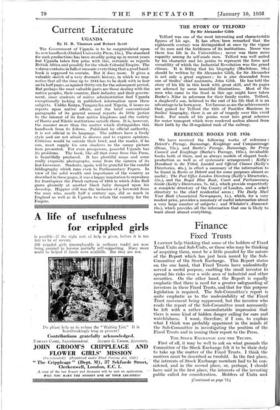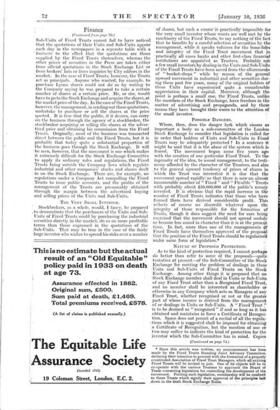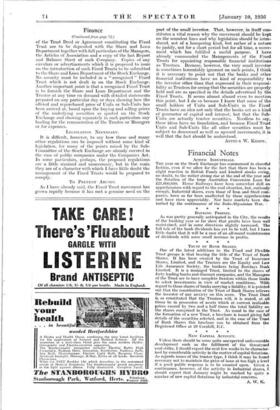Fixed Trusts
Finance
I CANNOT help thinking that some of the holders of Fixed Trust Units and Sub-Units, or those who may be thinking of acquiring them, must be a little puzzled by the nature of the Report which has just been issued by the Sub- Committee of the Stock Exchange. This Report states on the one hand, that Fixed Trusts have undoubtedly served a useful purpose, enabling the small investor to spread his risks over a wide area of industrial and other securities. On the other hand, the Report is equally emphatic that there is need for a greater safeguarding of investors in these Fixed Trusts, and that for this purpose legislation is required. The Sub-Committee's report is quite emphatic as to the undesirability of the -Fixed Trust movement being suppressed, but the investor who reads the report of the Sub-Committee must necessarily be left with a rather uncomfortable impressibii that there is some kind of hidden danger calling for care and watchfulness. I want, therefore,- if I-can, to explain what I think was probably .uppermost in the minds 6f the Sub'-Committee in investigating the posititsh of the Fixed Trusts and in issuing their report to the Press.
THE STOCK EXCHANGE AND THE TRUSTS.
First of all, it may be well to ask on what grounds the Committee of the Stock Exchange felt it to be their duty to take up the matter of the Fixed Trusts. .I think the motives must:be described as twofold. In the first place, the interests of!Stock Excihange inethberi had to Ve con- sidered, and in- the second place, or, perhaps; I should have said in the first place; the interests of the investing public called for consideration. Holders of Units and
.
(Cantinned on page 72.)
_ Finance
(Continued from page 70.)
Sub-Units of Fixed Trusts cannot fail to have noticed that the quotations of their Units and Sub-Units appear each day in the newspapers in a separate table with a " footnote to the effect that the quotations are those supplied by the Fixed Trusts themselves, whereas the other prices of securities in the Press are taken either from official quotations in the Stock Exchange List or from brokers' lists or from inquiries by City editors in the market. In the case of Fixed Trusts, however, the Trusts act as principals. Anyone who wanted, for example, to purchase Lyons shares could not do- so by writing to the Company saying lie was prepared to take a certain number of shares at a certain price. He, or she, would have to go to the Stock Exchange and acquire the shares, at the market price of the day. In the case of the Fixed Trusts, however, the management, in sending out these quotations, undertake to purchase or sell the shares at the price quoted. It is true that the public, if it desires, can carry , on the business through the agency of a stockbroker, the stockbroker acquiring or selling the shares at the adver- tised price and obtaining his commission from the Fixed Trusts-. Originally, most of the business was transacted direct between the public and the Fixed Trusts, but it-is probable that today quite a substantial proportion of the business goes through the Stock Exchange. It will be seen, however, that the movement is one which makes it extremely difficult for the Stock Exchange Committee to apply its ordinary rules and regulations, the Fixed Trusts being outside the Company laws which regulate !industrial and other companies' stocks and shares dealt in on the Stock Exchange. There are, for example, no regulations under a Company Act compelling the Fixed Trusts to issue public accounts, and the profits of the management of the Trusts are presumably obtained through the margin between the advertised buying. and selling prices of the Units and Sub-Units.
THE VERY SMALL INVESTOR.
Stockbrokers, as a whole, would, I fancy, be prepared to demonstrate that the purchasers of the Units and Sub- Units of Fixed Trusts could by purchasing the industrial securities directly in the market, do so on more profitable terms than those expressed in the quotations of the Sub-Units. That may be true in the case of the fairly large investor who wishes to spread his risks over a number of shares; ha-Such a course praetreillly- impossible for the very small investor whose wants are well met by the machinery of the Fixed Trusts, to say nothing of the fact that he benefits by a careful selection of securities by the -management, :while it speaks volumes for the bona-fides and integrity of the Fixed Trust 'movement that to - practically all cases banks and other first-class financial institutions are appointed as Trustees. Probably not a few small investors by dealing in the Units and Sub-Uns of the Fixed Trustslave-been saved from the allurements of " bucket-shops " while by reason of the general upward movement in industrialiand other securities dur- ina these past few years, many of the original holders Of these Units have experienced quite ..a considerable appreciation in their capital. Moreover, although the point is perhaps'- 'small one; 'the 'Fixed Trusts, unlike the members of the Stock Exchange, have freedom in the matter of advertising and -propaganda, and by thefie means they have brought. their wares to the attention of the small investor.
POSSIBLE DANGERS.
Where, then, does the danger lurk which causes so important a body as a sub-committee of the London Stock Exchange to consider that legislation is called fOr in order that °holders of Units and- Sub-Units in Fixed Trusts may be adequately protected ? In a sentence it might be said that it is the abuse of the,system which Is feared. The. movement began some five years ago with the creation of one particular Fixed Trust. To the ingenuity of the idea, to sound management, to the testi- mony afforded by the character of the Trustees, and alio to the general upward tendency of prices of shares in -which the Trust was interested it is due that the - movement spread rapidly; so that there is mks' an almo4 innumerable number of " Fixed " and " Flexible " Trusts with probably about £50,000,000 of the public's money invested. It is obvious that the rapid increase in tle number of Fixed Trusts indicates that those who ha* formed them have derived considerable profit. This reflects of course no discredit whatever upon the integrity of those responsible for the formation of Trusts, though it does suggest the need for care beizig exercised that the movement should not spread unduly .or become less sound in character than it is at the preset tit time. In fact, more than one of the, managements of Fixed Trusts have themselves approved of the propostil that the position of the Fixed Trusts should be regularised under some form of legislation.*
NATURE OF PROPOSED PROTECTION.
As to the kind of protection required, I cannot perha do better than refer to some of the proposals—quite tentative at present—of the Sub-Committee of the Stock Exchange for meeting the problem 'of dealings in these Units and Sub-Units of Fixed Trusts on the Stock 'Exchange. Among other things .it is proposed that no Stock Exchange member shall deal in Units or Sub-Units of any Fixed Trust other than a Recognised Fixed Trust, and no member shall be interested as shareholder or 'otherwise in any Company which acts as Managers of any Fixed Trust, whether recognised or not or the greater part of whose income is derived from the management of or dealings in Units or Sub-Units. A " Fixed Trust f' is to be deemed as " recognised " if and so long as it has . obtained and maintains in force a Certificate of Recogni- tion. Space does not permit of a recital of all the regula- -lions which it is suggested shall be imposed for obtaining a Certificate of Recognition, but the mention of one or two may suffice to indicate the kind of protection for the investor which the Sub-Committee has in mind. Copies
(Continued on page 74.) • Since this article was written, an announcement has beep made by the Fixed TrUsts Standing 'Joint Advisory Committee, declaring their intention to proceed with the formation of a properly constituted Association of Fixed Trust Managers, which all existint Fixed Trusts will be invited to join. One of its objects will be tO co-operate with the various Trustees to approach the Board nf Trade concerning legislation for controlling the development of the movement. Pending such legislation, membership will be confined -to those Trusts which signify their approval of the principles laid _down in the draft Stock Exchange Rules.
Finance
(Continued from page 72.)
of the Trust Deed or Agreement constituting the Fixed Trust are to be deposited with the Share and Loan Department together with full particulars of the Managers, the Articles of Association and a copy of the last Report and Balance Sheet of such Company. Copies of any circulars or advertisements which it is proposed to issue on the introduction of such Fixed Trusts to be submitted to the Share and Loan Department of the Stock Exchange. No security must be included in a " recognised " Fixed Trust which is not dealt in on the Stock Exchange. Another important point is that a recognised Fixed Trust is to furnish the Share and Loan Department and the Trustee at any time on demand with detailed statements prepared on any particular day or days showing how the offered and repurchased price of Units or Sub-Units has been arrived at, based upon the buying and selling prices of the underlying securities as quoted on the Stock Exchange and showing separately in such particulars any loading for the remuneration of the Trustee or Managers or for expenses.
LEGISLATION NECESSARY.
It is difficult, however, to say how these and many other regulations can be imposed without some kind of legislation, for many of the points raised by the Sub- Committee of the Stock Exchange are already covered in the case of public companies under the Companies Act. In some particulars, perhaps, the proposed regulations are a little strained and unnecessary, but in the main they are of a character with which I have little doubt the management of the Fixed Trusts would be prepared to comply.
To PREVENT ABUSES.
As I have already said, the Fixed Trust movement has grown rapidly because it has met a genuine need on the
part of the small investor. That, however, in itself con. stitutes a vital reason why the movement should be kept on the soundest lines and why legislation should be intro- duced, not of a hampering kind, but rather of a nature to justify, not for a short period but for all time, a move- ment which has fulfilled a useful purpose. I have already commended the Managements of the Fixed Trusts for appointing responsible financial institutions as Trustees. Because, however, the very small investor is sometimes lamentably ignorant on such points, I think it is necessary to point out that the banks and other financial institutions have no kind of responsibility to the investor other than that expressed in their responsi- bility as Trustees for seeing that the securities are properly held and are as specified in the details advertised by the Fixed Trusts. It seems almost absurd even to mention this point, but I do so because I know that some of the small holders of Units and Sub-Units in the Fixed Trusts have an idea not only that the banks act as a kind of guarantor of capital and interest, but that the Sub- Units are actually trustee securities. Needless to say, these ideas have no foundation, and because Fixed Trust Units and Sub-Units like all other securities must be subject to downward as well as upward movements, it is well that the fact should be understood.
ARTHUR W. KIDDY.












































 Previous page
Previous page